Insight to action blog #2: Conversations between decision makers and analysts
The quality of the analyst-decision maker relationship really matters when it comes to the translation of insights to action. Too often we hear of analysts feeling stuck in a corner, asked a question but not really knowing what it’s going to be used for. Alternatively, decision makers asking for…
Insight to action blog #1: From translation to application
“Solving complex problems requires new approaches to problem solving…To do this, organisations and communities need to become skilled in mobilising intelligence of all kinds – data, information, insights and ideas. In the 21st century, we believe this will matter as much as mobilising money or…
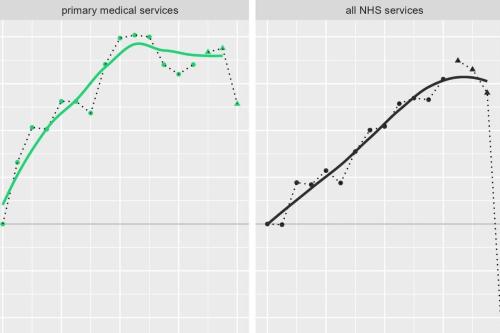
MDSN: GP practice productivity, efficiency, and continuity of care
GP Practice productivity, efficiency, and continuity of care In the previous two reports in this series, we showed that crude GP practice consultation rates, the average number of consultations per person per year, has been falling since 2012, whilst the need for consultations has been increasing.…
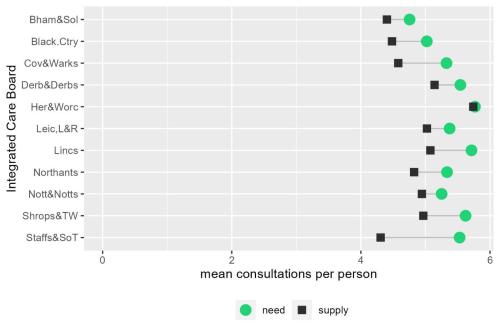
MDSN: The gap between need and supply of GP practice consultations
The gap between need and supply of GP practice consultations This is the second in a series of three analyses of GP practice service provision. In the previous paper in this series, we showed that GP consultation rates, the average number of consultations per person, increased between 1995…
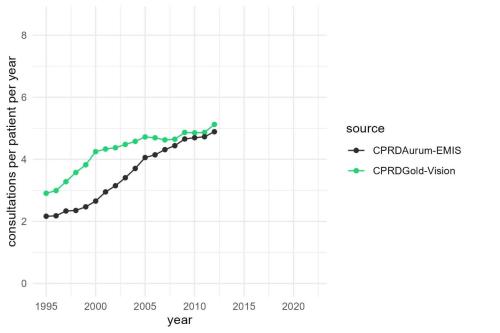
MDSN: Long-term trends in GP practice Consultation Rates
GP practice consultations are, by some distance, the most common interaction between the NHS and the population it serves. During these consultations, patient’s acute conditions are diagnosed and treated, their long-term conditions are managed, preventative interventions are delivered, and…

A Picture of End-of-Life Care in England
Working with Macmillan our analysis investigates who is more likely to experience poor outcomes associated with shortcomings in end-of-life care? Are there particular areas in England where those at end-of-life face significant challenges and how might the supply of services in an area be…
 Better use of analysis | Inequalities | Policy
Better use of analysis | Inequalities | Policy
Menopause and the NHS workforce
The impact of the menopause on the NHS workforce. The Strategy Unit and Health Economics Unit report on their mixed methods findings.

MDSN: AI tools for evidence synthesis
With the advancing sophistication of AI and automation-based tools, we explore their use for evidence synthesis. This topic has great importance in a world where insurmountable volumes of information present a growing challenge to the considered (and timely) inclusion of robust evidence at all…

Rural Health Inequalities
The UK Government (2016) define rural areas as those which “fall outside of settlements with more than 10,000 resident population”. This accounts for 90% of England, with 17% of the total population living in local authorities defined as rural (Department for Environment, Food & Rural Affairs,…

Leadership training and support for organisational development: an offer from the Strategy Unit
The Strategy Unit has long been known for the quality of its analytical work, and the clear, critical thinking that underpins it. More recently, we have been asked to provide leadership training and support for organisational development. Individuals, teams, organisations and Systems have found…
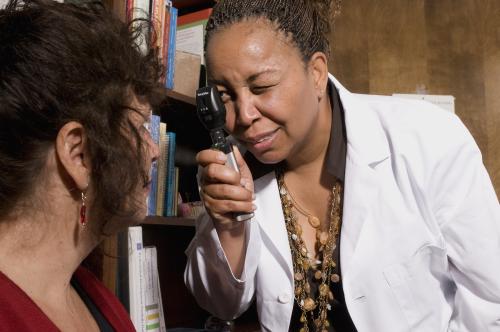
Review of Ophthalmic Managed Clinical Networks (MCNs) in Staffordshire and Shropshire
The aim of the MCNs is to bring together primary care optometrists with local ophthalmologists within a geographical area. This is a review Strategy Unit were commissioned by NHS England to work with a medical retina MCN in Shropshire, Telford and Wrekin and a glaucoma MCN in Staffordshire and…
 Emergency care | Inequalities | Primary, community and social care services
Emergency care | Inequalities | Primary, community and social care services
Learning about what works in urgent community response
The initial report from the national urgent community response (UCR) evaluation, along with an economic modelling tool to help service providers and systems understand the impact of UCR, is now available.

Exploring MSK Patient Pathways – Produced by Healthier Futures, Black Country
Exploring MSK Patient Pathways Patient Experiences: Facilitators and Barriers. And The Way Forward Full ReportJune 2023
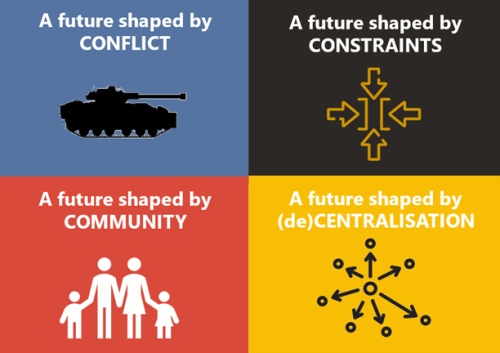 Primary, community and social care services
Primary, community and social care services
Exploring the Edge of Tomorrow, Today
Exploring the critical building blocks for a resilient social care system in 2035 with the West Midlands Association of Directors of Adult Social Services (WM-ADASS).
 Better use of analysis | Elective care | Inequalities
Better use of analysis | Elective care | Inequalities
Inclusive Elective Care Recovery
These case studies present the key features and learning from local initiatives which championed inclusive approaches to elective care recovery.
 Elective care | Emergency care | Policy
Elective care | Emergency care | Policy
How is growth in diagnostic testing affecting the hospital system?
Diagnostic services, such as medical imaging, endoscopy, and pathology, have grown substantially in recent years and at a faster rate than most other healthcare services. Increased diagnostic testing brings benefits to patients, but rapid growth of this service area within a complex, adaptive…
Insight to action blogs - a series of blogs from Lucy Hawkins
“Solving complex problems requires new approaches to problem solving…To do this, organisations and communities need to become skilled in mobilising intelligence of all kinds – data, information, insights and ideas. In the 21st century, we believe this will matter as much as mobilising money or…
 Secondary care | Service improvement
Secondary care | Service improvement
The NHS as an anchor institution: addressing fuel poverty
The number of households in fuel poverty in Staffordshire and Stoke-on-Trent (SSoT) is higher than the national average. As anchor institutions, NHS organisations can use their assets to influence the health and wellbeing of their local communities. The Strategy Unit was asked by the Midlands NHS…
 Better use of analysis | Policy | Integrated Care
Better use of analysis | Policy | Integrated Care
ICS intelligence functions – a toolkit to support the implementation of NHSE guidance
In 2020, NHSE announced the expectation that ICSs should develop “shared cross-system intelligence and analytical functions that use information to improve decision-making at every level.” This expectation has been followed by more detailed

Emergency department acuity measurement and process: quick scoping review
This review was commissioned to inform NHS England’s Acuity Standardisation Project which aims to agree a standardised method of allocating acuity category (a triage method) for Emergency Departments (EDs) and Urgent Treatment Centres (UTCs).